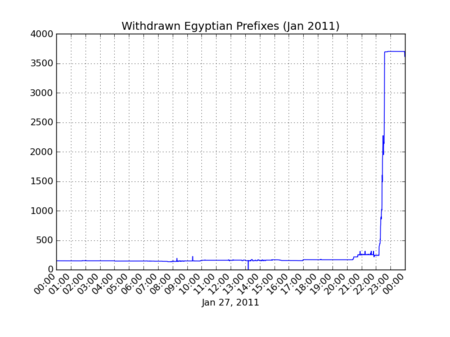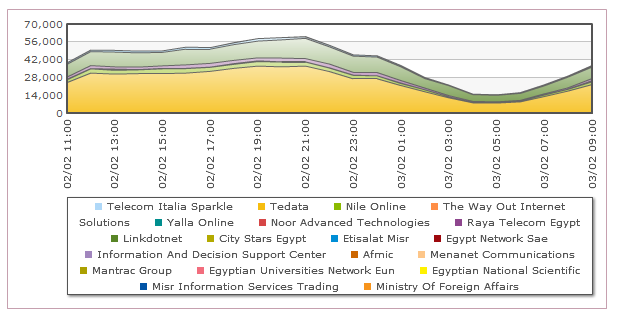Lord. Where to start? Well, some things happened in Egypt this week. I can’t think of a better way to cover them than to start a week ago, and end with today’s developments.

Egypt’s Internet blackout. For only the second time in history (the first being Burma during the Saffron Revolution), a country cut itself off completely from the Internet.

Traffic chart from Rensys covering January 27 in Egypt.
Al Jazeera releases Egypt coverage under Creative Commons license. The Qatar-based television network continued its long relationship with CC licensing by releasing photos and video for wide use.
Dialup made a comeback in Egypt. Once the Internet went down, geeks hit the beaches, including creating a host of dialup numbers for Egyptians to get on the Internet the old-fashioned way. Other ways around the Internet’s disappearance included Speak2Tweet, with Alive in Egypt jumping in to crowdsource the translation from Arabic into English. Tor use skyrocketed.
Sudan catches fire from Egypt. Tunisia’s uprising occasioned a number of protests around North Africa and the Middle East. One such was the series of protests in Sudan.
Last Egyptian ISP shuttered. The Egyptian authorities eventually decided to take Noor offline, the ISP the banking system and military used. One theory was less the continued leak of information and more worry about rich Egyptians continuing to send tens of millions of dollars out of the country in anticipation of the government collapsing.
Al Jazeera shuttered. Egypt revoked the Qatar-based news network’s license to broadcast in Egypt, knocking them off the air. Al Jazeera not only had the bad taste to cover the protests extensively, but was able to do so simultaneously in both Arabic and English.
Google marketing head seized off Cairo street. Wael Ghonim was seized in Cairo. He was only one among many, but is a public personality with a strong connection to a major American corporation.

Traffic chart from Cedexis covering February 2 to February 3 in Egypt.
Egypt Internet brought back online. I discovered this when I saw a missing friend, whom I had spoken with on the phone from Cairo, started posting on Twitter again. Why it the ISPs were brought back online is unclear, though the lack of effect it had on the protests, and the incredibly bad press it brought, may have contributed to the decision.
Vodafone forced to send pro-Mubarak texts. The mobile company said it was required by the Egyptian government to send all of its Egyptian subscribers pro-Mubarak text messages. Two other cell providers, Mobinil and Etisalat, were also said to have been forced to do so under the government’s emergency powers.
Yemen’s “day of rage.” Yesterday, a number of Yemen government sites were knocked out, possibly by the hacker collective, Anonymous. Today, tens of thousands of protesters went back out into the streets of the Arabian peninsula country’s capital Sanaa to call for its long-time president’s ouster. MidEast Youth created a crowdsourced site to capture information on the protests.

















